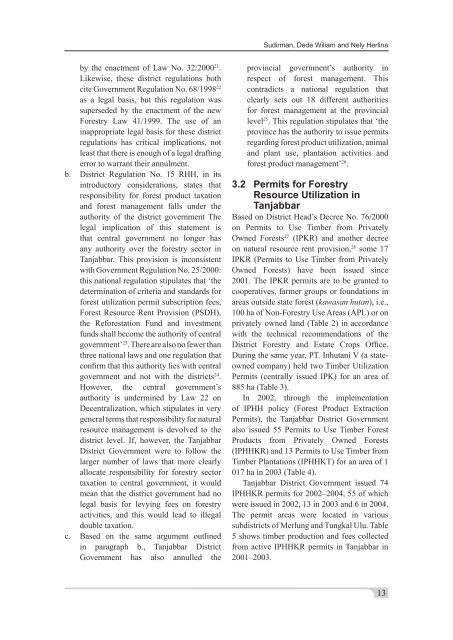Local policy-making mechanisms - Forest Climate Center
Local policy-making mechanisms - Forest Climate Center
Local policy-making mechanisms - Forest Climate Center
Create successful ePaper yourself
Turn your PDF publications into a flip-book with our unique Google optimized e-Paper software.
Sudirman, Dede Wiliam and Nely Herlinaby the enactment of Law No. 32/2000 21 .Likewise, these district regulations bothcite Government Regulation No. 68/1998 22as a legal basis, but this regulation wassuperseded by the enactment of the new<strong>Forest</strong>ry Law 41/1999. The use of aninappropriate legal basis for these districtregulations has critical implications, notleast that there is enough of a legal draftingerror to warrant their annulment.b. District Regulation No. 15 RHH, in itsintroductory considerations, states thatresponsibility for forest product taxationand forest management falls under theauthority of the district government Thelegal implication of this statement isthat central government no longer hasany authority over the forestry sector inTanjabbar. This provision is inconsistentwith Government Regulation No. 25/2000:this national regulation stipulates that ‘thedetermination of criteria and standards forforest utilization permit subscription fees,<strong>Forest</strong> Resource Rent Provision (PSDH),the Reforestation Fund and investmentfunds shall become the authority of centralgovernment’ 23 . There are also no fewer thanthree national laws and one regulation thatconfirm that this authority lies with centralgovernment and not with the districts 24 .However, the central government’sauthority is undermined by Law 22 onDecentralization, which stipulates in verygeneral terms that responsibility for naturalresource management is devolved to thedistrict level. If, however, the TanjabbarDistrict Government were to follow thelarger number of laws that more clearlyallocate responsibility for forestry sectortaxation to central government, it wouldmean that the district government had nolegal basis for levying fees on forestryactivities, and this would lead to illegaldouble taxation.c. Based on the same argument outlinedin paragraph b., Tanjabbar DistrictGovernment has also annulled theprovincial government’s authority inrespect of forest management. Thiscontradicts a national regulation thatclearly sets out 18 different authoritiesfor forest management at the provinciallevel 25 . This regulation stipulates that ‘theprovince has the authority to issue permitsregarding forest product utilization, animaland plant use, plantation activities andforest product management’ 26 .3.2 Permits for <strong>Forest</strong>ryResource Utilization inTanjabbarBased on District Head’s Decree No. 76/2000on Permits to Use Timber from PrivatelyOwned <strong>Forest</strong>s 27 (IPKR) and another decreeon natural resource rent provision, 28 some 17IPKR (Permits to Use Timber from PrivatelyOwned <strong>Forest</strong>s) have been issued since2001. The IPKR permits are to be granted tocooperatives, farmer groups or foundations inareas outside state forest (kawasan hutan), i.e.,100 ha of Non-<strong>Forest</strong>ry Use Areas (APL) or onprivately owned land (Table 2) in accordancewith the technical recommendations of theDistrict <strong>Forest</strong>ry and Estate Crops Office.During the same year, PT. Inhutani V (a stateownedcompany) held two Timber UtilizationPermits (centrally issued IPK) for an area of885 ha (Table 3).In 2002, through the implementationof IPHH <strong>policy</strong> (<strong>Forest</strong> Product ExtractionPermits), the Tanjabbar District Governmentalso issued 55 Permits to Use Timber <strong>Forest</strong>Products from Privately Owned <strong>Forest</strong>s(IPHHKR) and 13 Permits to Use Timber fromTimber Plantations (IPHHKT) for an area of 1017 ha in 2003 (Table 4).Tanjabbar District Government issued 74IPHHKR permits for 2002–2004, 55 of whichwere issued in 2002, 13 in 2003 and 6 in 2004.The permit areas were located in varioussubdistricts of Merlung and Tungkal Ulu. Table5 shows timber production and fees collectedfrom active IPHHKR permits in Tanjabbar in2001–2003.13

















